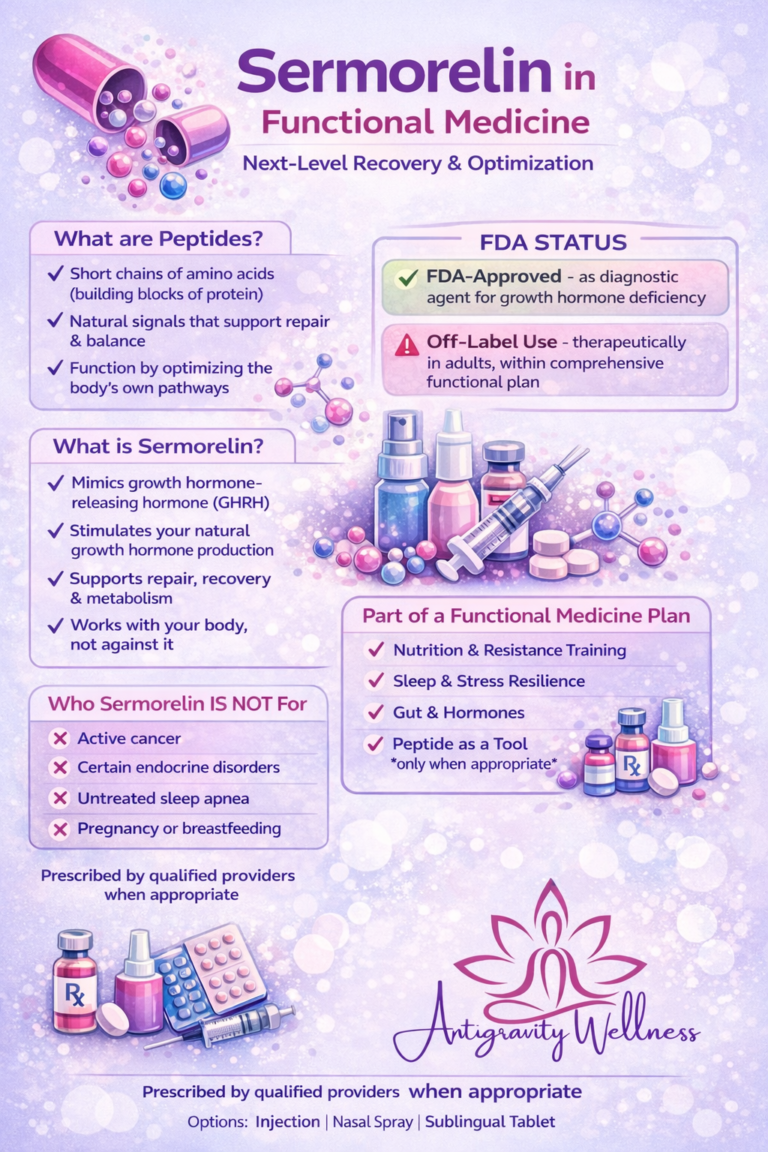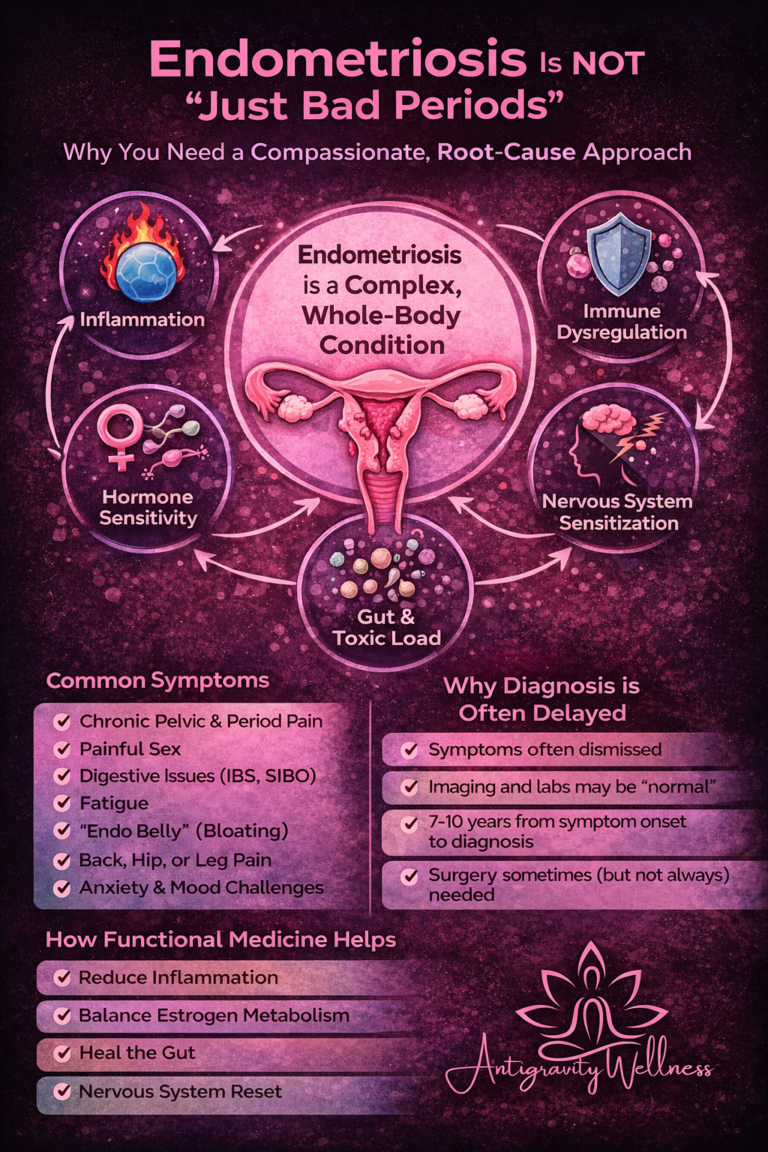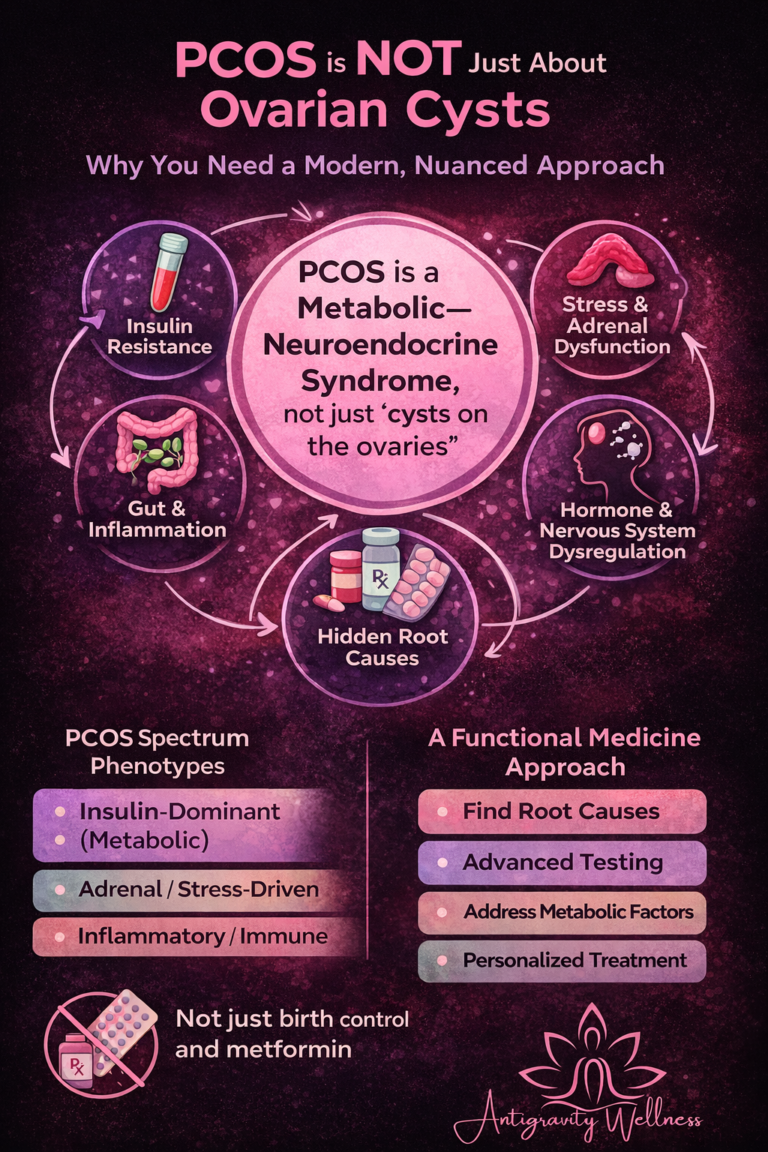
“Why am I so tired all the time?” Linda asked me during her visit, shoulders slumped and eyes heavy. She was juggling work, kids, and household responsibilities. Despite sleeping eight hours, she woke up groggy, craved sugar in the afternoon, and couldn’t get through her mornings without coffee.
Her doctor told her, “You’re fine. Your labs are normal.” But Linda didn’t feel fine—she felt like she was running on empty.
What Linda was experiencing is something I see often: adrenal fatigue and burnout. The good news? Once you understand how your adrenals work, there are simple steps you can take to restore your energy naturally.
What Are the Adrenals and Why Do They Matter?
Your adrenal glands are two small glands that sit on top of your kidneys. Even though they’re tiny, they’re mighty. They:
- Release cortisol, the “stress hormone” that helps you wake up in the morning and handle stress.
- Release adrenaline, which gives you quick energy in emergencies.
- Help balance your blood sugar, blood pressure, and your sleep-wake cycle.
When stress is short-term, your adrenals work well. But when stress is constant—like deadlines, lack of sleep, poor diet, or even over-exercising—your adrenals get stuck in overdrive. Over time, they can’t keep up. This leads to:
- Constant fatigue
- Brain fog
- Sugar or salt cravings
- Trouble sleeping
- Feeling “tired but wired”
- Relying on caffeine just to get through the day
This state is often called adrenal fatigue or burnout.
How to Restore Your Energy Naturally
1. Balance Your Blood Sugar
Skipping meals or eating sugar-heavy foods makes your blood sugar spike and crash. Each crash forces your adrenals to release stress hormones.
👉 Build meals with protein, healthy fat, and fiber-rich carbs. Example: chicken + rice + broccoli + avocado.
2. Get Morning Sunlight
Your adrenals release cortisol in the morning to wake you up. Morning sunlight resets this rhythm so your body knows when to be alert and when to rest.
👉 Step outside within 30 minutes of waking for 5–10 minutes.
3. Prioritize Restful Sleep
Sleep is when your adrenals repair. Poor sleep keeps cortisol high at night, leaving you more exhausted the next day.
👉 Turn off screens an hour before bed, sip calming tea, and keep your room cool and dark.
4. Cut Back on Caffeine
Coffee forces your adrenals to pump out more stress hormones. This gives quick energy but leads to crashes.
👉 Swap one cup of coffee for green tea or herbal tea.
5. Practice Stress Resets
Chronic stress is the #1 reason adrenals burn out.
👉 Try box breathing: inhale for 4, hold for 4, exhale for 4, hold for 4. Repeat for 3 minutes.
6. Feed Your Adrenals Nutrients
Stress uses up vitamins and minerals quickly. Your adrenals need Vitamin C, B vitamins, magnesium, zinc, and protein to work well.
👉 Add foods like berries, leafy greens, nuts, seeds, and lean protein daily.
7. Stay Hydrated
Dehydration is stress on your body.
👉 Drink half your body weight in ounces of water daily (ex: 160 lbs → 80 oz).
Case Study: Maria’s Recovery
Maria, a 42-year-old teacher, came to me with overwhelming fatigue, brain fog, and nightly sugar cravings. She was drinking 4 cups of coffee a day just to stay awake.
We started with simple steps: balancing her meals with more protein, slowly cutting back her caffeine, and adding a bedtime routine. Within 3 weeks, she noticed fewer afternoon crashes. By 2 months, she no longer needed her daily candy bar. By 3 months, her energy was steady and she started exercising again.
Maria didn’t need “more willpower”—she needed to support her adrenals. With the right steps, her body finally had a chance to recover.
Ready to Restore Your Energy?
If you’ve been feeling drained, foggy, or stuck in survival mode, you don’t have to stay there. Here’s how to take your next step:
👉 Step 1: Download the free Adrenal Recovery Guide to get daily tools that support your adrenals.
👉 Step 2: Enroll in the free 5-Day Hormone Reset Mini-Course to jumpstart your hormone health.
👉 Step 3: Ready for deeper help? Book a Brief Initial Consult with me. Together, we’ll check your hormones, create a custom plan, and get your energy back.
References
- Tsigos C, Chrousos GP. “Hypothalamic–pituitary–adrenal axis, neuroendocrine factors and stress.” J Psychosom Res. 2002;53(4):865-871. https://pubmed.ncbi.nlm.nih.gov/12377295/
- Sapolsky RM. “Stress and the brain: Individual variability and the inverted-U.” Nat Neurosci. 2015;18(10):1344–1346. https://pubmed.ncbi.nlm.nih.gov/26404708/
- McEwen BS. “Protective and damaging effects of stress mediators.” N Engl J Med. 1998;338(3):171–179. https://www.nejm.org/doi/full/10.1056/NEJM199801153380307
- Mayo Clinic. “Adrenal fatigue: Is it real?” Accessed 2024. https://www.endocrineharmony.sg/adrenal-fatigue-signs-when-to-see-endocrinologist/
- Nieman LK. “Diagnosis of adrenal insufficiency.” UpToDate. 2024. https://www.uptodate.com/contents/diagnosis-of-adrenal-insufficiency-in-adults
- Wilson JL. Adrenal Fatigue: The 21st Century Stress Syndrome. Smart Publications, 2001. https://www.amazon.com/Adrenal-Fatigue-Century-Stress-Syndrome/dp/1890572152




